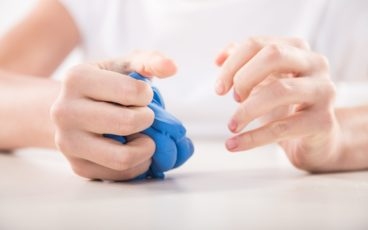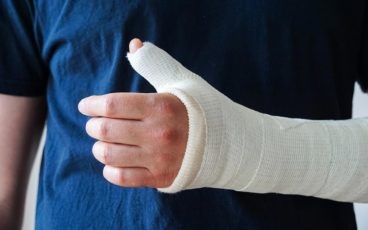Trigger finger can be a very painful condition that limits the movement of the affected finger. The phrase “trigger finger” comes from the quick snapping or sudden popping of the finger when it unlocks from a bent position, similar to releasing a gun trigger. Patients usually have complaints of soreness at the base of the affected finger. This is then followed by catching or locking of the finger, which usually gets worse with time. On occasion, straightening the trigger finger my require assistance from the other hand.
What causes trigger finger?
Trigger finger usually happens when a tenosynovium, a protective coat on a tendon, is inflamed causing the tendon to become stuck and unable to move freely inside the tenosynovium. The inflammation of the tenosynovium can cause the space between the tendon sheath to narrow and become restricted. When the tendon struggles to slide through the sheath, the finger may experience the trigger sensation.
Health conditions like arthritis and diabetes may cause trigger finger, as well as repeated use of the finger or hand. Occupations or hobbies that require constant use of the fingers, like a guitarist, may also be affected by trigger finger due to repeated use and strain on the fingers for long periods of time.
Symptoms of Trigger Finger
The most common symptom of trigger finger is the locking and snapping of the finger, but here are some additional symptoms:
- Snapping sensation as you attempt to straighten your finger
- Grasping objects may cause the finger to lock
- Finger stiffness in the morning
- Bump at the base of the affected finger
Treating Trigger Finger
Treatment of trigger finger depends on the severity of the injury. Minor cases may only require rest, ice and anti-inflammatory medications. However, moderate cases may require splinting and physical therapy, and in severe cases surgery may be required.
In severe cases doctors may also recommend a procedure called percutaneous trigger finger release, which is when doctors use a needle to release the locked finger.
Reduce or eliminate your pain
Trigger finger can be a very painful condition that affects your everyday life and your hands are vital to your independence. If you are suffering from any of the above symptoms, see an orthopedic physician immediately. The physicians at IBJI are experts at can help to reduce or eliminate your finger pain, and retain functionality of your hand. Contact an IBJI physician today.
*This content is for information only and is not intended to replace the diagnosis, treatment, or medical advice from your treating healthcare professionals. The content does not provide medical advice, does not constitute the practice of medicine or other healthcare professional services, and does not create a doctor-patient relationship. You should not rely on this information as a substitute, nor does it replace professional medical advice, diagnosis, or treatment. If you have concerns or questions, seek the advice of your healthcare professionals. If you think you may have a medical emergency, call your doctor or 911 immediately. Do not rely on electronic communications or communicate through this website for immediate, urgent medical needs. This website is not designed to facilitate medical emergencies. The use of the information is at the reader’s own risk. The links are provided for information and convenience only. We cannot accept responsibility for the sites linked or the information found here. A link does not imply an endorsement of a site.




